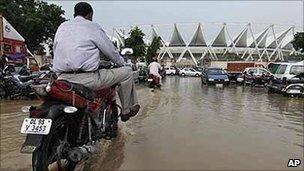Disease threat at Delhi Commonwealth Games site
- Published

Floodwater can be seen near many of the main games venues
India's Commonwealth Games village in Delhi is being threatened by dengue fever-carrying mosquitoes which are breeding in a nearby swamp.
Experts say the threat has been made worse because about 3,000 Delhi fumigators - who normally would deal with the problem - are on strike.
Delhi's health minister has asked for army expertise to help drain water from the swamp, close to the River Yamuna.
Athletes are due to arrive for the start of the games in a fortnight.
Dengue fever is a mosquito-borne disease that causes severe head, muscle and joint pains.
The BBC's Sunil Raman in Delhi says that the games have been plagued by allegations of corruption, missed deadlines, leaky buildings and poorly-paid labourers.
Meanwhile, seven Indian athletes selected for the games face lengthy bans after "B" samples of their failed dope tests also returned positive, officials say.
Four wrestlers, a shot-putter and two swimmers - who were all part of India's games squad - tested positive for methylhexaneamine, a banned stimulant widely used as a nasal decongestant.
Stagnant pools
The strike by Delhi Municipal Corporation workers has meant that games organisers have had to turn to the army and private contractors to tackle the mosquito menace.
The fumigators are demanding permanent jobs and higher wages at a time when 1,500 people have been admitted to hospitals with dengue fever.
Responding to British concerns about the dengue threat, the Indian high commission in London issued a statement on Thursday which says the virus currently circulating is "of a milder nature".
"The government of India has undertaken a series of measures that have had a direct impact on reducing the aegypti mosquito and bringing the situation under control," the statement says.
It says that "stagnant water pools everywhere" have been sprayed with larvicide and "attendant source reduction measures" have been implemented to eradicate breeding.
"All public and private buildings would be visited by municipal teams to ensure that all possible breeding places are comprehensively free of the mosquitoes," the statement said.
But critics say that athletes are being housed in apartment buildings built on the flood plain of the river which has swollen after copious monsoon rains.
They say that in turn has produced numerous stagnant pools of water which are ideal habitats for mosquitoes.
The problem could get even worse because the neighbouring state of Haryana has released huge quantities of water into the Yamuna to prevent flooding.
- Published3 September 2010
- Published25 August 2010
- Published25 August 2010